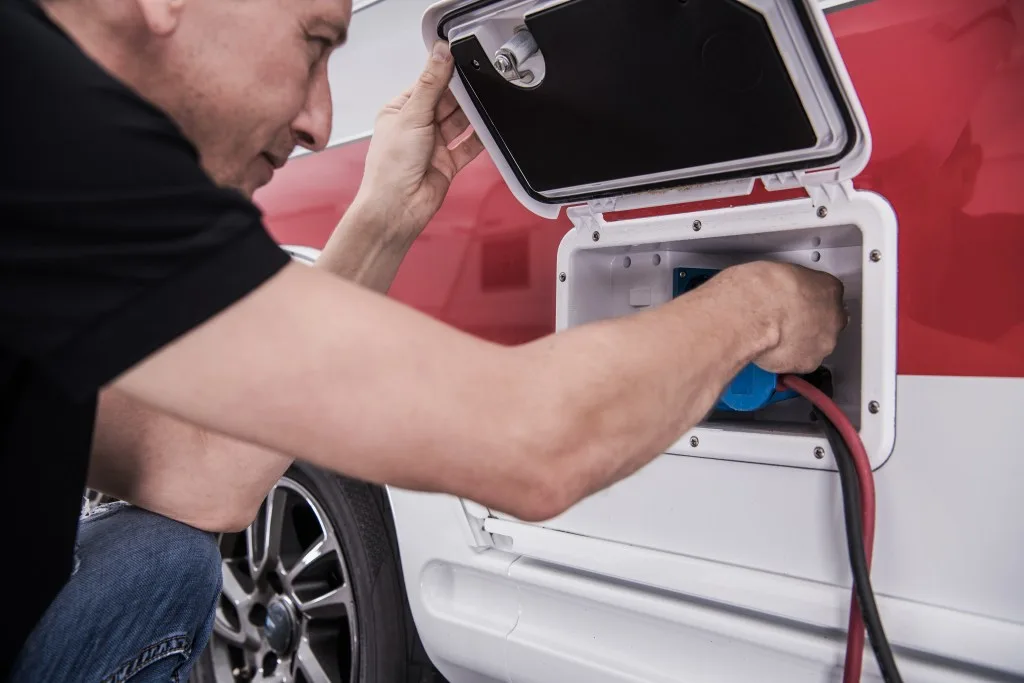Are you considering towing your RV or camper but unsure how to power its lithium battery system? If so, you’re not alone. Many people struggle with the same dilemma. Will a tow vehicle be able to fully charge its lithium batteries as they travel from place to place?
Here, we’ll tackle this question head-on. We provide important tips for charging an RV’s lithium battery system while traveling in tow.
What Is an RV Lithium Battery System?
An RV lithium battery system is an innovative way to power your RV. Lithium batteries can be easily used as house batteries in RVs. They provide superior performance and higher capacity than traditional lead-acid batteries.
They offer much higher efficiency, resulting in significantly less charging or maintenance time and better overall energy retention. This type of battery system can provide long hours of reliable power for all sorts of electronic devices, from lights and fans to TVs. This is all while having the ability to run certain appliances like refrigerators and microwaves.
Lithium batteries have far fewer self-discharge issues than their lead-acid counterparts. That means a longer lifespan that can help take your RVing lifestyle even further.
Will a Tow Vehicle Fully Charge My RV Lithium Battery System?
The answer is theoretically yes, but realistically, a tow vehicle fully charging an RV lithium battery system rarely happens.
This is because the tow vehicle’s alternator has to work hard to charge the starter battery and power the RV’s lights, brakes, and other electrical equipment. This provides what’s basically a trickle charge to the lithium batteries.
Unfortunately, with limited resources and energy for everything, the amount of electricity that gets through to actually charge the lithium batteries is often insufficient for them to reach a full charge. This, of course, also depends upon factors such as how much battery capacity you have and how depleted they are.
Also, if you’re driving long distances, you stand a better chance of gaining a full charge. However, you shouldn’t fully rely on your tow vehicle to get a full charge.

How Long Does It Take for My Truck’s Alternator to Charge My RV Lithium Batteries?
Several factors influence how long it takes for a truck’s alternator to charge RV lithium batteries. The main factors are equipment and capacity.
How many amp hours of lithium batteries are you trying to charge, and what’s the state of their charge? What is the size of the truck’s alternator? How much excess current does it have available to safely provide a charge?
There are other factors, such as how optimal the setup is between the truck’s alternator, the RV lithium battery system, and the battery charging rate. But the primary factors have to do with battery capacity and alternator capacity.
For example, let’s say your RV has 200 amp hours of lithium battery capacity. Let’s also say that after providing the necessary electricity to the tow vehicle battery and components, as well as the electrical components of the RV, the alternator has 5 amps left to charge the batteries.
If the RV batteries need 80 amps to reach a full charge of 200 amp hours, it will take the alternator in this scenario 16 hours to provide a full charge. If the alternator had a little more excess power, say 10 amps, this scenario would reduce the fully charged time to eight hours.
Pro Tip: Bust open these 5 Myths of RV Lithium Batteries before you start upgrading your RV battery set-up.
Can You Leave Lithium Batteries on Charge All of the Time?
As long as you are using a charger (or your RV has an appropriate charger in its convertor), it’s rather difficult to overcharge most RV lithium-ion batteries.
Most modern chargers have the appropriate settings to supply the required current and voltage to charge lithium-ion batteries. The batteries themselves also have technology that makes them safe.
These batteries require constant current and a constant voltage charging profile to achieve a safe, full charge. When the charger provides the necessary current until the appropriate voltage of the battery is reached, the current stops flowing.
As long as the voltage is correct and the current is not excessive, the battery should safely receive a full charge. Most RV lithium-ion batteries also have a built-in battery management system that helps protect them from excessive current and overcharging or overheating.

How Do You Know When Lithium Battery Is Fully Charged?
An RV lithium battery is fully charged when it reaches a voltage of around 14.6 volts while charging. Once the battery is idle and no longer actively charging, its resting voltage should be around 13.3 to 13.6 volts when fully charged.
But how do you know when the battery has reached those charging benchmarks? There are a couple of ways.
The simplest way is to get a multimeter that measures voltage. Almost any basic multimeter does this basic function. You can use the multimeter to check the voltage while the battery is actively charging or resting.
Another way to check an RV lithium battery’s state of charge is with a battery monitor. This is a device with a display that’s usually hard-wired into the battery set-up.
The display of a battery monitor will tell you the state of charge, typically as a percentage of 100%, as well as some other readings, such as voltage. That sometimes includes power consumption and estimated remaining operating time.
Pro Tip: We crunched the numbers to find out How Many Batteries Does an RV Need to Operate Seamlessly?
What Happens If a Lithium Battery Gets Overcharged?
Overcharging is when charging is allowed to continue to the point that the voltage in battery cells rises beyond their normal voltage. This causes heat build-up in the cells. Heat build-up causes chemical reactions, damaging the cells and limiting their lifespan.
If overcharging continues, the heat build-up and chemical reactions intensify. This can cause a more dangerous situation, including catching fire or explosions.
Overcharging most modern lithium-ion RV batteries is a rarity. Most chargers have the appropriate settings and safeguards to stop charging when the batteries reach a full charge. The batteries themselves typically have one or more protection circuits to keep them from overcharging.
The combination of an appropriate charger and well-built lithium batteries greatly reduces the risk of overcharging in modern RV lithium battery systems.
What Other Ways Can You Charge Your RV Lithium Battery System?
There are plenty of ways to charge your RV lithium battery system, many of which don’t involve relying on your tow vehicle.
If you’d like to be off the grid, solar panels or a generator are excellent ways to charge your batteries. And when you’re not off the grid and have access to shore power, there’s really no better or faster way to get your lithium batteries back to a full charge than plugging in.
With the right set-up and knowledge, you can easily keep your RV battery system charged without relying too heavily on your tow vehicle.
Discover the Best Free Camping Across the USA
To be honest with you, we hate paying for camping. There are so many free campsites in America (with complete privacy).
You should give it a try!
As a matter of fact, these free campsites are yours. Every time you pay federal taxes, you’re contributing to these lands.
Become a FREE CAMPING INSIDER and join the 100,000 campers that love to score the best site!
We’ll send you the 50 Best Free Campsites in the USA (one per state). Access the list by submitting your email below: